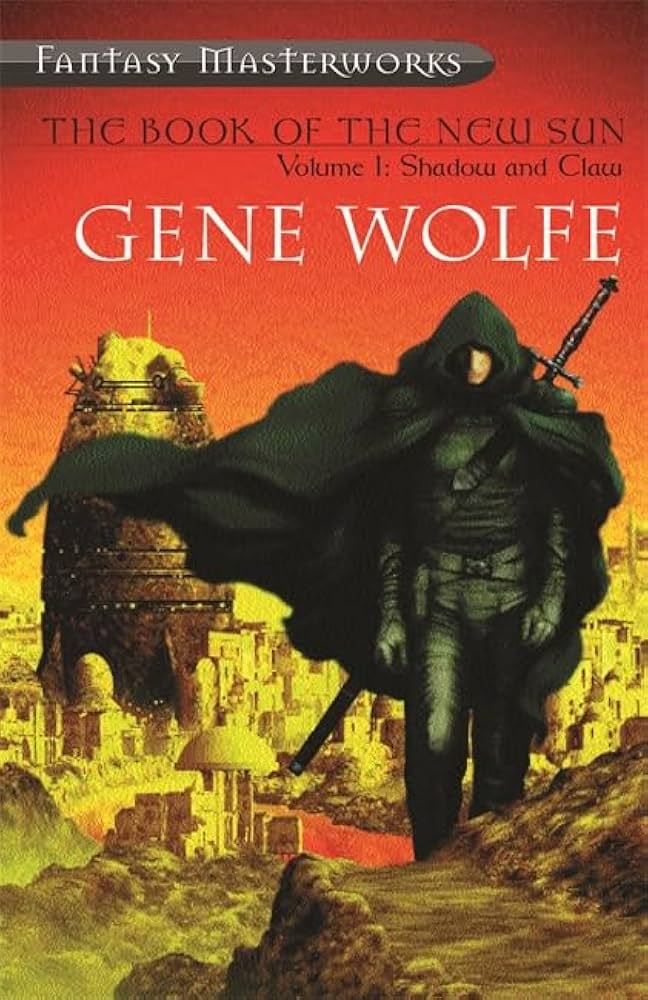I was 17-18 the first time I read The Book of the New Sun, and I remember it melting my mind. For the first time everything I’d hated about English classes: the interpretation of what authors meant, the use of hidden symbols and double meanings, the context and subtle allegories they’re referring to…everything I despised, because of its lack of consistent logic (Math and Sciences were my favourite subjects)… All of it clicked. It clicked when I read this book. I understood why reading a book with hidden meanings can be fun. I understood why literary devices are useful. Why they make for good storytelling. Why they can make you think…
The Book of the New Sun is not an easy read. Nor a quick one. So flowery is Severian’s language, and his use of archaic English, pseudo Latin, and extinct fauna and flora (which Gene Wolfe uses as a device purposefully. The afterword refers to the book as a translation from a future language. Having to find the closest twentieth century analogues), that in the first few chapters you’d be forgiven if you get a dictionary to look some words up. I’m 35. I’ve read a lot. Like. A lot.Yet I was googling for the first few chapters (this despite the fact I’ve read the book before, albeit nearly two decades ago) – until I gave up, and allowed myself to just be overwhelmed and confused. To pick up the meaning, where I could from the context. Like when one read during childhood. Which is the point. You’re not supposed to know that a sabretache was a kind of pouch people wore in medieval times. You’re supposed to pick up that Severian is wearing a kind of pouch that has some heraldic-esque quality to it, because in this dying earth world, technology has become so far advanced that society has become feudal again.
As you read on, and you patiently, slowly read about this world, so that it’s picture builds in your minds eye, a way almost no other fantasy book has done for me, you discover that Severian is playing a game with you. Very mild spoiler here: Severian is an unreliable narrator. He boasts about his perfect memory, yet there’s always a foreshadowing about how he couldn’t remember during the moment, but can picture everything clearly as he is writing it down to us. Slowly you see how he contradicts himself. And you realise – of course he does. He is an emperor writing his account of how he became emperor. Of why he has the right to be an emperor. Either the claw of the conciliator chose him…or he stole it and is retroactively writing history. Vae victis. Woe to the vanquished. History is written by the winners.
Reading this again has been a bit like a love letter to myself. This series changed me. It made me appreciate literature and its devices. It made me hunger to read not just for entertainment, but for something…more. It started me on a path to thinking about what makes for good writing, and not good writing. What I like and what I don’t like. What I would do if I wanted to really make a point, and not just spin a good yarn.
It isn’t for everyone. But a fair warning – if you read this, you’ll find it rich beyond measure. (A sign of the motifs and themes – Wolfe wrote Severian as a Jesus figure. As Jesus was a carpenter, working as a craftsman, he saw Severian, a torturers apprentice in the same vein. Someone who worked with wood and nails. There’s also, you know, something about The Passion, torture, fill this space with your own way of writing points about comparative literature themes). I’ve heard that many a masters thesis and some PhDs have included The Book of the New Sun. Whether that’s true or not, I leave for you to work out. Just as you have to puzzle out what’s true or not in Severian’s tale… However all I’ll say is, I’m not surprised. It is a series worth the puzzle. Worth the re-reads to figure out it’s meanings. To find the answers to the questions it poses to you.
(Also to the 17-18 year old me who read this and got something out of it… slow clap. I keep thinking about all the dumb stuff you did and how much of an idiot you were. But I just wanted to say – you really did know your stuff. Thanks for everything.)
Review originally written on Goodreads on 16 June 2025

